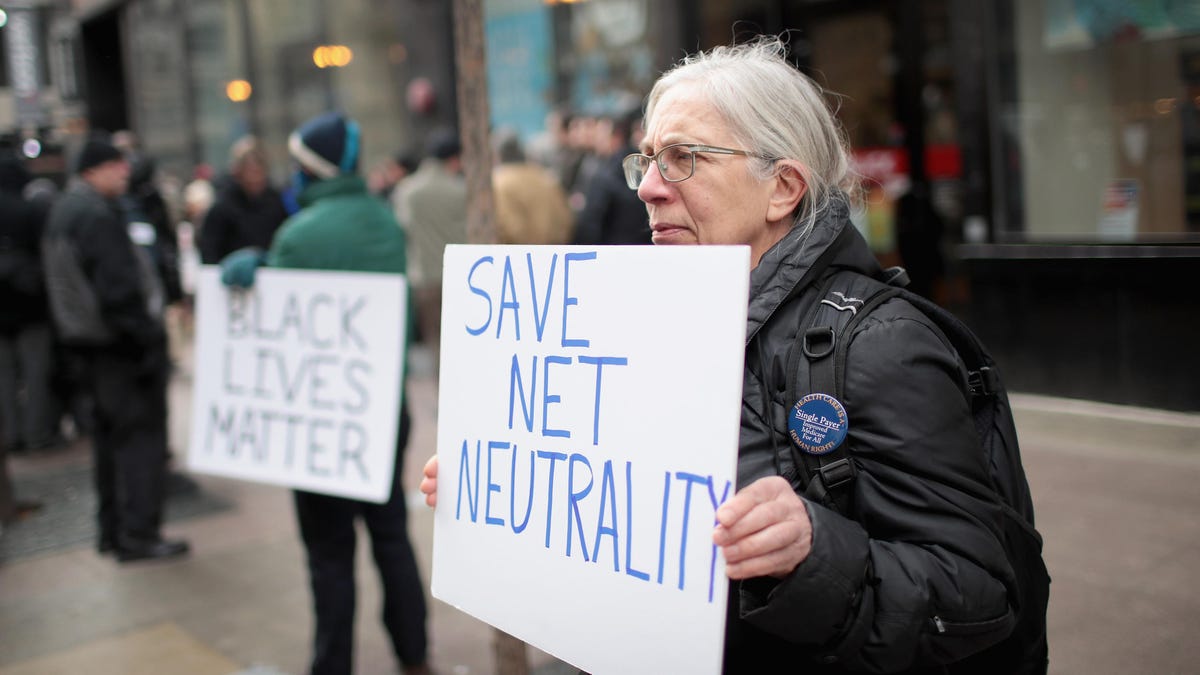Net neutrality fight gets ugly with robocalls spreading false claims
The robocalls reportedly target senior citizens in California.

Activists protest the repeal of net neutrality.
As if robocalls weren't annoying enough, now they're reportedly spreading misinformation in a fight against net neutrality.
This includes falsely saying that an upcoming California net neutrality bill may raise their cell phone bill by $30 if passed. One of the robocalls, which are likely targeting senior citizens, was transcribed in a report by Motherboard, it states:
"Your Assembly member will be voting on a proposal by San Francisco politicians that could increase your cellphone bill by $30 a month and slow down your data. We can't afford higher cell phone bills. We can't afford slower data. We can't afford Senate Bill 822."
The robocalls mark the latest twist in the never-ending battle for net neutrality, or the rules governing an open internet. The proposed California law, Senate Bill 822, makes no mention of higher rates or slower data. The threat of a price hike could be related to a part of SB 822 that bans a practice called zero-rating, which lets carriers offer some services without it eating into your data cap.
Carriers have argued that zero-rating saves consumers money because you save on data consumption. But net neutrality proponents, including California State Senator Scott Wiener, the author of the bill, argue it gives carriers an unfair advantage because it lets them prioritize their own services, ultimately leading to higher prices in the long run. They also act as an incentive to the carriers to keep data caps lower.
The act of adding an actual dollar amount alongside a warning about slower data puts the message squarely into the category of fiction.
The calls emerged after SB 822 has made significant progress through the state's legislative process. Internet service providers like Comcast and wireless players like AT&T, Verizon and T-Mobile are adamantly against the bill because it reinstates much of the rules that were stripped away after the Federal Communications Commission's national repeal. Indeed, the bill has garnered the label the "gold standard" of net neutrality protections because it clarifies certain practices like zero rating.
Weiner tweeted about the robocalls, calling it a "misinformation campaign."
We’re now dealing with a straight-up misinformation campaign on our #NetNeutrality bill, #SB822: industry robo-calls to seniors falsely telling them that protecting net neutrality will increase their phone bills by $30. Scaring seniors w lies about their financial security? Gross pic.twitter.com/1Lgop6KwSl
— Scott Wiener (@Scott_Wiener) August 25, 2018
The robocalls are reportedly backed by the Civil Justice Association of California (CJAC) and the Congress of California Seniors (CCS), and specifically target seniors. According to Motherboard, CJAC has financial ties to AT&T, and the CCS lists AT&T and Verizon as key supporters on its website. Both telecom companies are known opponents of net neutrality, but they denied involvement when contacted by Ars Technica.
Verizon told CNET that "Verizon is not supporting this robocalling initiative California. Our company is neither engaged nor involved."
AT&T, the FCC, the CJAC and CCS didn't immediately respond to a request for comment.

